The Not So Strategic Bitcoin Reserve

In this article:
Remember all the hype at the start of the year about the imminent launch of a US Strategic Bitcoin Reserve?
The mania was palpable. Bitcoin influencers were falling all over themselves with excitement, social media posts were ALL IN CAPS, and everyone was growing increasingly confident that a “God candle” was imminent.
The rumour mill was running wild, and apparently the “smart money” already knew that the Trump administration would announce the Strategic Reserve on “day 1,” before going on a spending spree to acquire between “one and four million coins.”
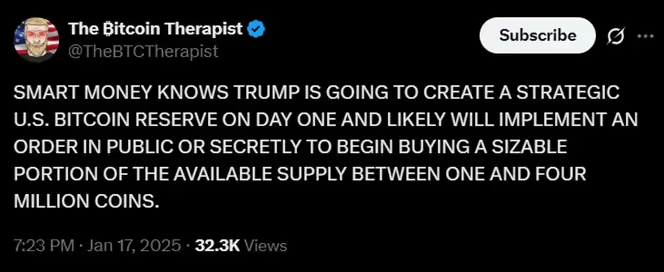
Looking back, it’s all rather amusing. Bitcoin was designed to separate money and state, yet Bitcoiners everywhere were quick to encourage the government’s involvement, so long as it would pump their bags and make them rich.
The irony, of course, is that the US government doesn’t have any money of its own. The only way it could ever raise the funds to acquire that much Bitcoin would be via taxation or by diluting everyone’s savings through monetary inflation.
These are normally things that Bitcoiners would argue are immoral, but it seems the appeal of a large buyer with bottomless pockets entering the market and pushing prices higher is just too irresistible.
Talk about weapons grade-hopium…

Getting excited about the prospect of the US government using printed money to buy Bitcoin reveals some pervasive faulty thinking that still exists in the Bitcoin community. It demonstrates that people are still measuring their wealth in dollars. When they see “number go up,” they feel like they are winning.
What they fail to grasp is that Bitcoin’s price in dollars can rise, while their purchasing power in real terms remains relatively flat, because the dollar is simply haemorrhaging value.
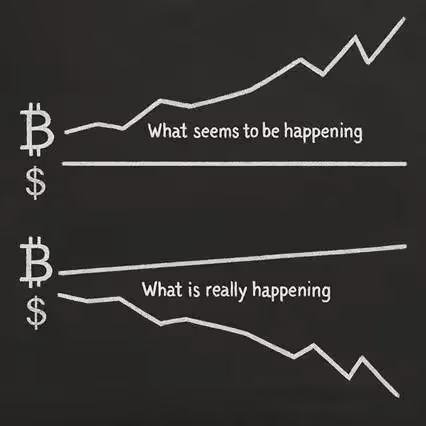
When you plot Bitcoin’s performance against something less volatile than the dollar, like gold, you realise that its performance hasn’t been as incredible as its increasing dollar value might suggest.
In Nov 2021, BTC/GOLD peaked at 37.70 oz/BTC, whereas today it’s only 35.20 oz/BTC. In gold terms, Bitcoin hasn’t reached a new ATH for almost 5 years.
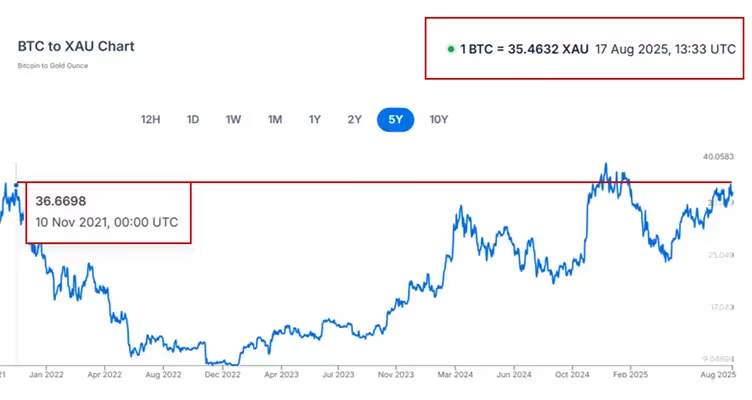
The government printing money to buy Bitcoin would certainly inflate its price in dollar terms, but when you’re more interested in real purchasing power rather than amassing government coupons, it’s hard to get excited about.
Nonetheless, the US government signalling a desire to own Bitcoin is undeniably a huge endorsement of its true value. Bitcoin may pose a threat to the dollar’s dominance and the government’s ability to print money, but they have now realised that ignoring it poses an even bigger threat.
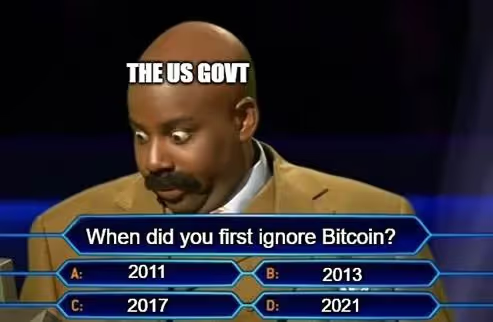
So, since the new administration started signalling their support for Bitcoin, how have things been progressing? Is the US government really going to eagerly start buying Bitcoin to build a Strategic Reserve?
The Strategic Bitcoin Reserve – How it Started
Well, as you might expect, Trump didn’t announce a US Strategic Bitcoin Reserve on day 1 of his presidency. I guess the smart money that knew it was going to happen wasn’t so smart…
Instead, a few months later, things got off to what can only be described as a questionable start with some eyebrow raising social media posts from the new commander-in-chief:
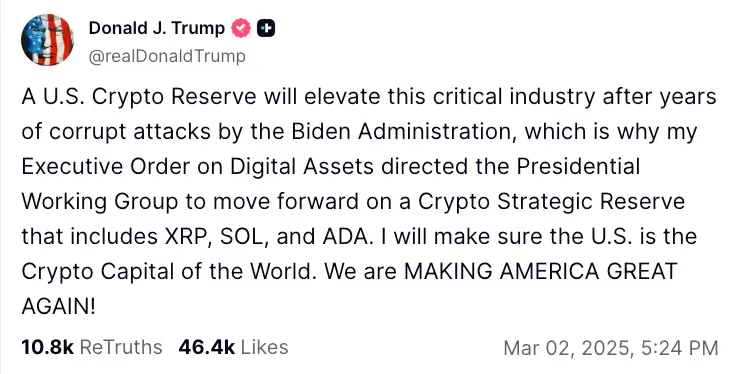

Wait, politicians are shitcoiners? Colour me surprised…
What’s clear from these posts is that the government either has no idea what they are doing, or wants to intentionally muddy the waters by lumping Bitcoin in with a bunch of pre-mined, VC-funded scam coins.
Either way, it certainly wasn’t the announcement that a lot of Bitcoiners had been hoping for. Shitcoiners meanwhile were ecstatic about the prospect of the government lending credibility to their vapourware.
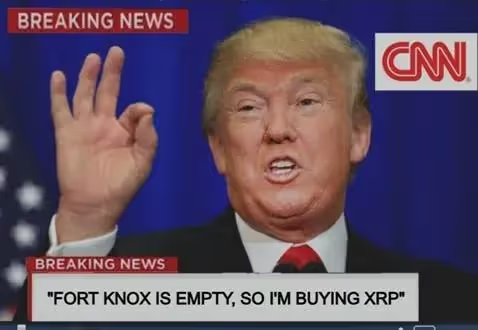
Thankfully, within a week, more clarity emerged as Trump made things official by signing an historic Executive Order to establish the long awaited Strategic Bitcoin Reserve.
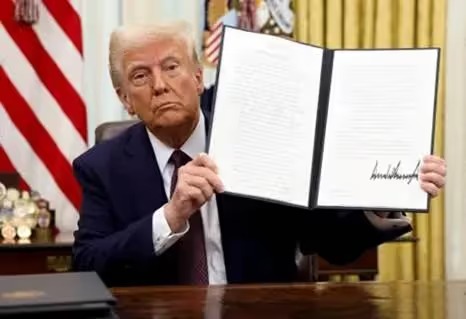
By this point the administration might have taken some much-needed feedback on board, as the official announcements from the White House made a much clearer distinction between Bitcoin and other “digital assets.” The Executive Order states that the “Strategic Bitcoin Reserve” would contain Bitcoin only, and any other coins would be held in a separate “Digital Asset Stockpile.”
The EO also goes on to state that any Bitcoin deposited into the reserves must not be sold, but makes no such provision for the shitcoins held in the “Digital Asset Stockpile.”
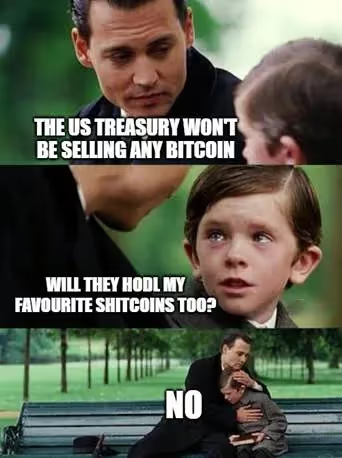
But what about actually buying Bitcoin for the Reserve? If the rumours were to be believed, then the US government was going to be feverishly buying between 1 and 4 million coins!
When Moon?

Well, it turns out that the news was far less bullish than people had hoped. The Executive Order makes no mention of plans to directly buy Bitcoin on the open market. Instead, it makes the rather lacklustre commitment that “The Secretary of the Treasury and the Secretary of Commerce will begin developing strategies to acquire additional Bitcoin for the reserve, so long as these strategies are ‘budget neutral’ and don’t impose costs on American taxpayers.”
Hardly the buying bonanza we were promised by so many click-hungry influencers…
The Strategic Bitcoin Reserve – How it’s Going
Since this nothing burger could no longer satisfy people’s insatiable hunger for hopium, all became quiet on the Western front. Over time the Strategic Bitcoin Reserve fell out of the news cycle as it became obvious that a tidal wave of government money wasn’t about to enter the market.
That is, until this week when Treasury Secretary Scott Bessent went on Fox News and referenced the Strategic Bitcoin Reserve directly. In his own words he made it clear that the US government had no plans to start buying Bitcoin:
“We’re not going to be buying any, but we are going to use confiscated assets and continue to build that up”
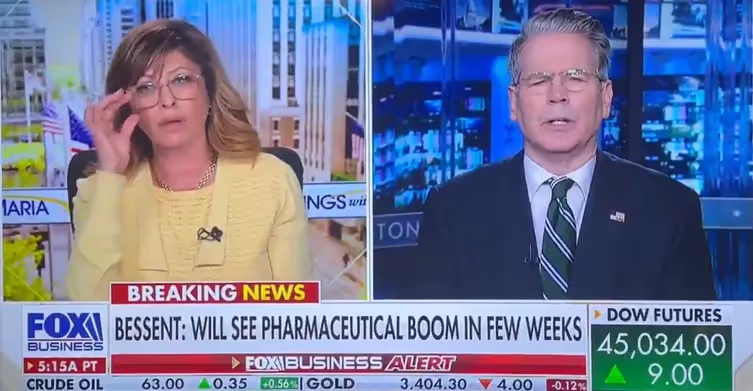
From his comments, it would appear that the government’s preferred method to grow its Strategic Bitcoin Reserve is not buying more, but confiscating more.
As you might expect, many Bitcoiners, especially those who had made the most noise about the Reserve, became rather upset by this news…

The strong reaction Bessent received from the Bitcoin community in response to his comments must have been loud enough to appear on his radar, because not long afterwards he made the effort to try and clarify his position in a post on Twitter:
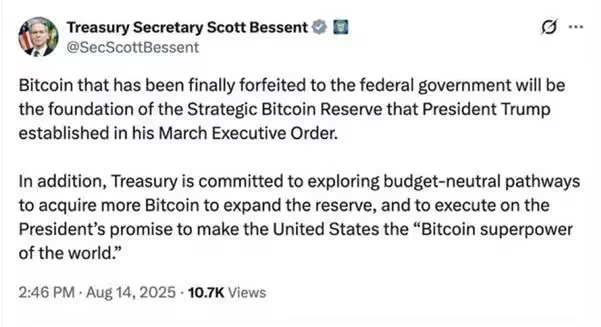
You’ll notice that he still makes no suggestion that the government will actively purchase Bitcoin, but the word ‘confiscation’ has been subtly removed to make the government’s accumulation plans sound less villainous.
It won’t appease hardcore Bitcoiners, but it might be enough to placate the less informed.
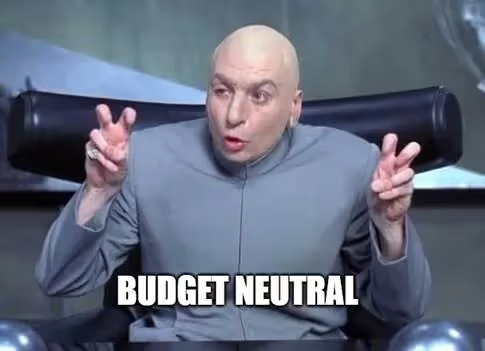
In the end, Bessent’s comments and follow up post don’t add anything to the discussion that wasn’t already outlined in the original Executive Order. He is simply falling back to the party line.
So, despite the renewed commotion about the SBR this week, the only real update is, there is no update.
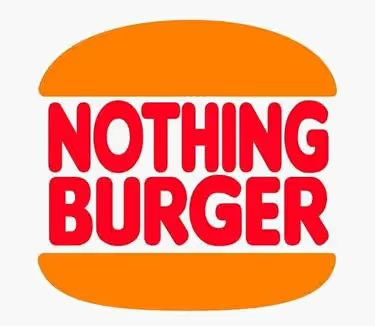
Why the US Government Won’t Start Buying Bitcoin
Have you ever heard the phrase ‘Turkey’s don’t vote for Christmas’?
It’s one of the strongest arguments for why the US government are extremely unlikely to want to publicly be seen exchanging dollars for Bitcoin.

The US Dollar is the world’s reserve currency, and provides the US government with strategic advantages that grant it extraordinary power and influence.
Having seigniorage privilege over the world’s reserve currency allows the US to print dollars at low cost to finance budget deficits, while global demand absorbs excess supply without triggering immediate domestic inflation. This enables sustained borrowing and spending for things like military operations or social programs without suffering the true costs. And in times of crisis, the US can devalue the dollar and export inflation abroad, bolstering its own economic resilience while shifting the burden to others.
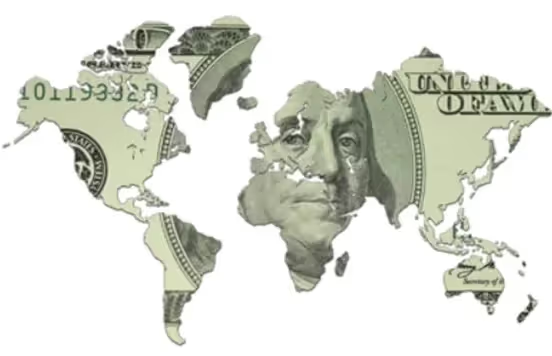
The dollar’s dominance also helps the US wield significant leverage through control of the global financial infrastructure, including systems like SWIFT, which empowers it to impose economic sanctions by restricting adversaries’ access to dollars, as seen in cases involving Iran and Russia.
Strategically, this financial hegemony supports US geopolitical goals by funding expansive policies, influencing allies and foes through economic dependencies, and deterring challenges to American interests.
It is most definitely in the US government’s interest for the dollar to maintain its status as the world reserve currency.

Can you imagine the optics if the US government were seen to be openly exchanging dollars for Bitcoin? What would happen to the global demand for dollars if its own issuer is signalling that even they prefer Bitcoin?
If the US government does ever start exchanging dollars for Bitcoin, you can rest assured that they will go to extreme lengths to make sure you don’t hear about it.
What is ‘Budget Neutral’ Bitcoin?
While it’s unlikely that the US government will start openly buying Bitcoin with dollars any time soon, that doesn’t mean that they don’t have an interest in growing the amount of Bitcoin they hold in the Strategic Reserve.
But what on earth does “budget neutral” even mean? How can the US government acquire Bitcoin without incurring any cost? What kind of fiat alchemy would enable that?
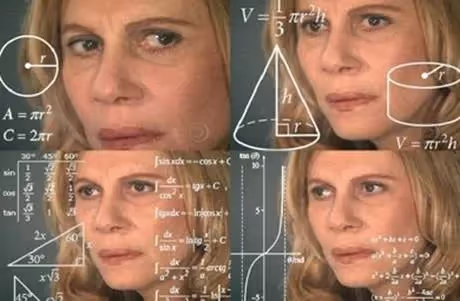
It’s anybody’s guess at this stage, but here are some of the proposals that have been tabled so far.
Revaluing Gold Holdings to Buy Bitcoin
One proposed strategy is to revalue the US Treasury’s gold reserves, currently accounted for at a historical cost of about $42.22 per ounce (far below the market price of over $2,500 per ounce in 2025). This revaluation could generate a “paper profit” of hundreds of billions without selling the gold, which could then be used to purchase Bitcoin.
Proponents argue this is budget neutral because it leverages “unrealised gains” rather than new spending or debt, but so far Bessent has dismissed any immediate plans to do this. Probably because doing so just signals to the rest of the world that the US government is more bullish on Bitcoin than dollars and gold.
But for fun, let’s pretend it’s because Elon did actually audit Fort Knox…
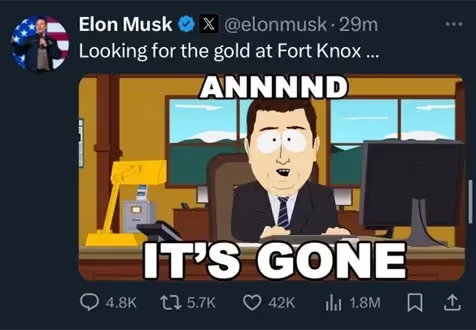
Utilising Tariff Surpluses to Buy Bitcoin
Another proposed strategy to acquire Bitcoin without impacting the federal budget would be to use surpluses generated from Trump’s new tariffs on imports. This would align with the Executive Order’s mandate for budget-neutral acquisitions.
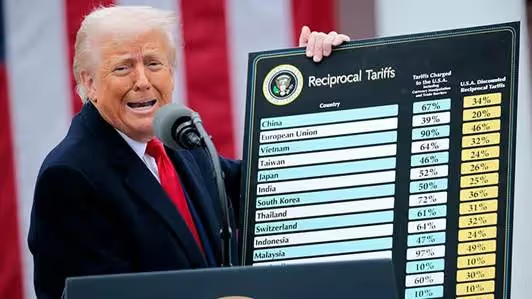
The trouble with this strategy is that it’s extremely presumptive that import tariffs will generate a surplus. Global trade is complex, and there is no absolute guarantee that the new tariffs will succeed in generating significant income for the US.
It also ignores the fact that Trump was quite vocal about using tariffs as a way to eradicate income taxes for American citizens. So which is it? Abolish income taxes or buy Bitcoin? And would taking income generated in dollars and converting it into Bitcoin really send the right message to the world about the government’s confidence in the dollar?
Issuing Bitcoin Bonds or Specialised Debt Instruments
The government could issue “Bitcoin Bonds” or other debt instruments to raise the funds to buy Bitcoin in a ‘budget-neutral’ way. If structured correctly, backing the bonds with existing reserves or expected returns from Bitcoin’s future appreciation would allow the government to acquire BTC without increasing the deficit.
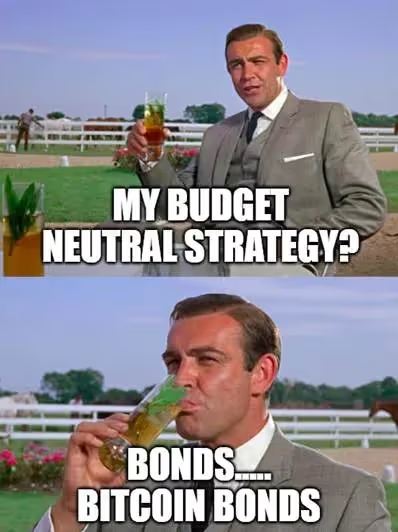
But is this likely? If the US government issues Bitcoin bonds, then what effect might that have on traditional bonds? There is a risk that the bond market starts demanding increasingly higher interest rates on treasury bonds because the government’s tacit support of Bitcoin might suggest that they are predicting the dollar’s decline.
Again, the US would have to be very careful about what kind of message issuing a Bitcoin bond would send to the rest of the world.
Confiscating Bitcoin
The only way the US government has ever acquired Bitcoin in the past 16 years is via criminal or asset forfeiture, and for the moment this seems like the path of least resistance for increasing the amount of Bitcoin held in the Strategic Reserve.
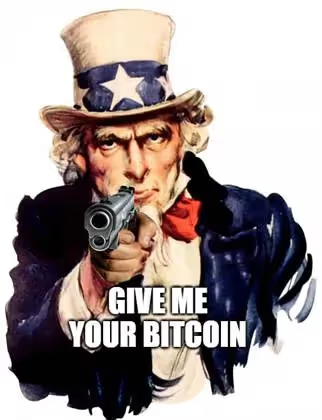
In practice, it’s extremely difficult for the US government to confiscate Bitcoin held in self-custody by private citizens, and deploying resources to try would be anything but “budget neutral.”
But in 2025 there is now plenty of Bitcoin being concentrated in places where, with a few strokes of a pen, the US government could gain control over a significant amount of UTXOs with ease. Bitcoin left on exchanges, held by ETFs, or amassed by Treasury Companies could become very attractive targets for the US government if they can find ways to justify taking control of the funds.
Any Bitcoin held in these centralised honeypots are only one ‘national emergency’ away from being seized in a potential 6102 style event and offer the US government a potential route to acquiring large amounts of Bitcoin without signalling a loss in confidence in the dollar.
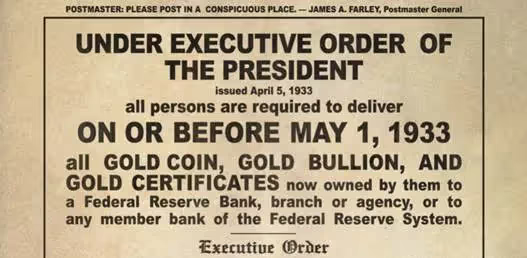
Secure Your Own Bitcoin Reserve
The only Bitcoin Reserve you should be concerned about is your own. Yes, the US government is likely to want to grow its own stack over time, but while it’s currently stuck between wanting to own Bitcoin, but also not wanting to destroy confidence in the dollar, there is a unique opportunity for you to get ahead of the game and front run them.

What should also be clear is that one of the most effective methods the government can employ to increase their Bitcoin holdings is to simply take it from someone else. If you are building your own Bitcoin Reserve, it’s extremely important that you don’t leave it somewhere like an exchange where it can easily be seized.
The conclusions that should be drawn here are simple. Ignore the clownish machinations of your government, build your own reserves, and make sure you store your Bitcoin in full self-custody far out of reach from the state.
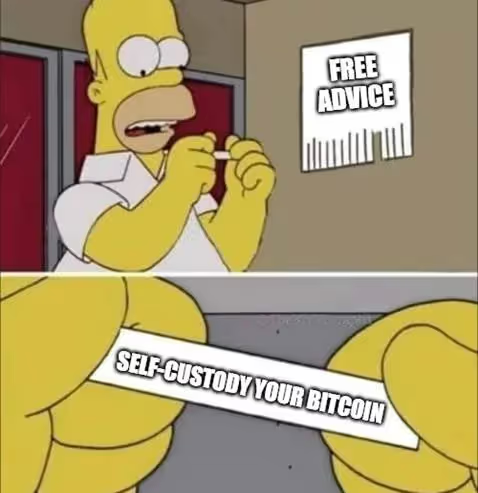
Our experts can help you do exactly that. Within just a few training sessions our experts will teach you how to buy and secure your Bitcoin like a pro so that your plans are far more strategic than Uncle Sam’s. All you need to do to get started is book a free 30-minute call.
